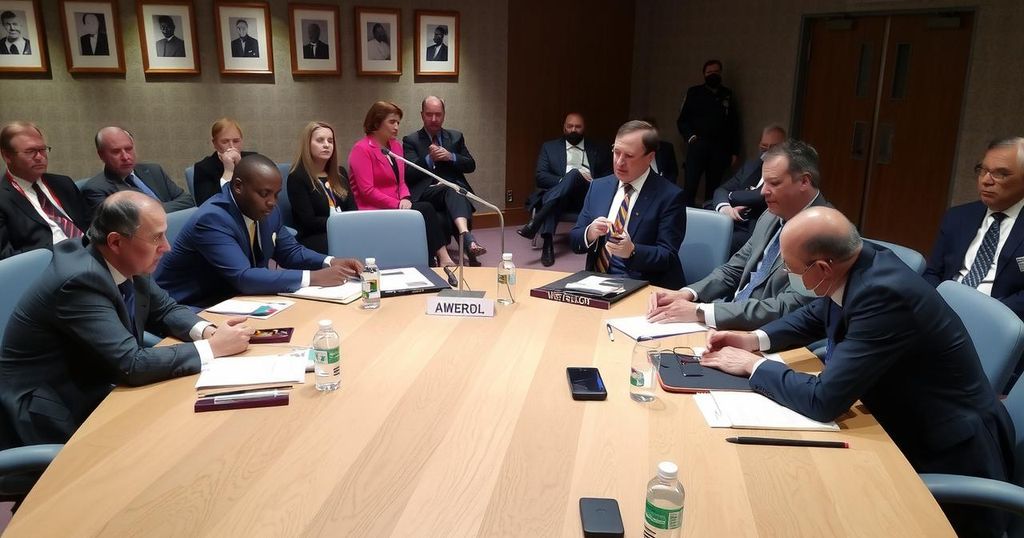UN Security Council Addresses Urgent Need for Peace in Eastern DR Congo

The UN Security Council discussed escalating violence in eastern DRC, emphasizing the need for cohesive efforts among local and regional leaders to foster lasting peace. UN Special Representative Bintou Keita reported on security challenges posed by armed groups and commended regional mediation initiatives, while highlighting the humanitarian crisis affecting millions due to displacement and violence, particularly gender-based violence.
The United Nations Security Council convened recently to address the ongoing violence in the eastern Democratic Republic of the Congo (DRC), as reported by the UN Special Representative, Bintou Keita. The briefing highlighted critical developments, particularly the political rifts concerning constitutional reforms and the worsening security situation in the regions of North Kivu and Ituri, plagued by violent incidents involving several armed factions, including ADF, M23, CODECO, and Zaïre.
Ms. Keita commended regional mediation efforts, particularly those led by Angola through the Luanda process, and emphasized the necessity for local, national, and regional strategies to work in concert for sustainable peace. The DRC is set to host a summit on December 15, which presents an opportunity for collaboration among Angola, Congo, and Rwanda, aimed at stabilizing the region. Keita asserted, “local, provincial, national and regional processes should be dovetailed in order to foster lasting peace and stability.”
Further developments in the DRC’s governance model were noted, emphasizing reforms designed to enhance the populace’s purchasing power and access to essential services. Ms. Keita urged all stakeholders to collaborate actively to manage potential tensions surrounding constitutional amendments and to uphold the nation’s stability. The ongoing ceasefire agreement between the DRC and Rwanda, along with measures to monitor compliance, was also acknowledged during the briefing.
Despite these diplomatic efforts, significant insecurity persists in eastern provinces, with the M23 group gaining extensive territorial control in North Kivu while the ADF remains the most lethal force, causing substantial civilian casualties. The prevalence of conflict is exacerbated by the exploitation of natural resources, with the M23 seizing strategic locations like gold sites.
The humanitarian crisis, intensified by climate change, has resulted in nearly 6.4 million people being displaced owing to conflict and disasters. Humanitarian funding has improved, with the 2024 Humanitarian Response Plan achieving just over 50% of its funding goal, signaling enhanced support amid worsening conditions.
Highlighting the plight of women, the DRC has seen over 90,000 reports of gender-based violence this year, with significant occurrences in North Kivu. Ms. Keita praised governmental efforts to combat impunity through reparations, reiterating a commitment to a zero-tolerance policy against sexual exploitation by UN personnel. She also applauded the International Criminal Court for renewing investigations into crimes in the DRC, particularly in North Kivu since January 2022, pointing to a collective call for peace voiced by women and vulnerable communities.
The Democratic Republic of the Congo has been embroiled in conflict for decades, particularly in its eastern regions where various armed groups vie for control over resources and territory. The UN has played a key role in mediating peace efforts and stabilizing the region through missions like MONUSCO. Political instability and governance challenges have further complicated peace efforts, necessitating ongoing dialogues and intervention from both international and regional actors to establish lasting peace and enhance humanitarian conditions for the affected populations.
In summary, the Security Council’s session underscored the urgent need to address the violence in eastern DRC while recognizing the progress made through regional partnerships and governance reforms. The humanitarian crisis remains dire, with millions displaced and significant reports of gender-based violence. Collective efforts involving local, national, and international stakeholders are critical for fostering long-term peace, stability, and recovery in the region, acknowledging the voices of those most affected by conflict, especially women and children.
Original Source: news.un.org








